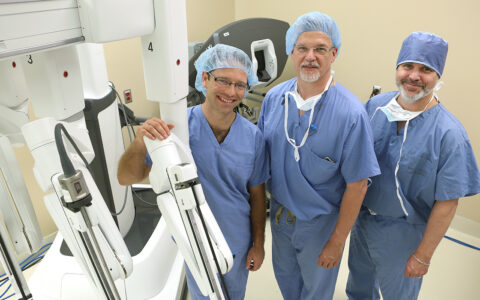For the past decade, all patients admitted for surgery or outpatient care at Vanderbilt University Medical Center have been offered a short health-literacy questionnaire to probe associations between health literacy and health outcomes, as well as to examine use of resources.
Answers to the questionnaire, known as the Brief Health Literacy Screen (BHLS), were compiled for use in multiple studies, including several by urologic oncologists Kelvin Moses, M.D., Ph.D., and Amy N. Luckenbaugh, M.D., who were able to stratify patient demographics and clinical features of urologic cancer patients by health-literacy levels.
“We chose to study patients with radical cystectomy, because it requires a lot of teaching and information.”
In 2022, they published a review on the links between health literacy and poorer outcomes in patients seeking urologic oncology care. Focusing on radical cystectomy, they’ve reported higher rates of minor complications – such as ileus, urinary tract infection, need for total parenteral nutrition and pneumonia – in patients with low health literacy.
They are now poised to publish additional research on ties between health literacy and discharge status after surgery, and overall survival.
“In urology, we have looked at the associations of health literacy in prostate cancer, but we hadn’t looked at its role in surgical morbidity before now,” Moses said. “We chose to study patients with radical cystectomy, because it requires a lot of teaching and information.”
Diligence Needed
Radical cystectomy is the standard of care in the treatment of muscle-invasive bladder cancer (MIBC). The procedure entails removal of the urinary bladder and pelvic lymph nodes and creation of a urinary diversion. For urinary diversions, patients must learn to manage a urinary stoma and supplies like skin barrier devices, and how to handle collection bags or self-catheterize.
“These patients need to understand basic anatomy, follow detailed instructions, and keep to a schedule,” Moses said.
Yet, while average reading ability in the United States remains static at around a sixth- to eighth-grade level, many hospital brochures and instructions are written at a 10th to 12th-grade reading level, he said.
“There are a lot of treatment choices that are available. The patient has to have an understanding of what they are being offered in order to make good decisions,” Moses said.
He says much of the learning from patients with MIBC also applies to other patients with cancer who must maintain a post-surgical surveillance schedule and take precautions in Bacillus Calmette-Guerin intravesical therapy at home.
Literacy Associations
In a 2017 article, Moses and his Vanderbilt colleagues published findings that illustrate the absolute rate of discharge services associated with lower health literacy in patients undergoing radical cystectomy. They also established demographics and the impact of continent versus incontinent urinary diversion on the need for discharge services.
A year later, a 2018 study from a different research group demonstrated that 80.5 percent of patients with bladder cancers with adequate health literacy were adherent to follow-up cystoscopies and intravesical therapies, while only 56.6 percent of those with low health literacy were adherent to instructions.
These studies teed up Moses’ and Luckenbaugh’s longitudinal research on radical cystectomy patients.
“We are finding that patients with low health literacy also have more minor complications and are more likely to be discharged to an inpatient rehabilitation facility. These two factors are shown, in multiple other cancers, to be related to long-term survival,” he said.
Fostering Change
Moses and Luckenbaugh are hoping that other centers will conduct similar research and that the composite will broadly influence communications practices.
“Since reading levels have historically remained static, our hope of improving the situation hinges on how well we can compensate on our end, as healthcare centers and as clinicians,” Moses said.
He says they hope to better identify where the deficits are most glaring so that remediation interventions target the most critical stages in treatment decision-making. In the meantime, he finds that the use of physicians’ most scarce commodity reaps benefits over the long term.
“Since reading levels have historically remained static, our hope of improving the situation hinges on how well we can compensate on our end, as healthcare centers and as clinicians.”
“Because I’m cognizant of health literacy, I try to take the time to ascertain what their level of understanding is. Instead of handing out literature, I’ll explain it, drawing figures and showing them the imaging so we can see it together,” Moses said. “If someone makes a decision that seems ill-advised, I try to find out why. Are they making the decision for themselves? These conversations can be complex.”
Vanderbilt researchers have also generated publications on the impact of health literacy in abdominal surgery, diabetes, breast cancer, and the NICU. They are broadly leading the way in finding the best interventions for patients throughout the Southeast region, where health literacy is the lowest in the nation.





